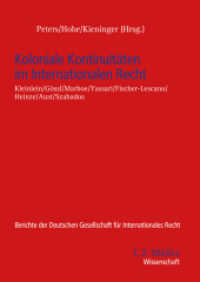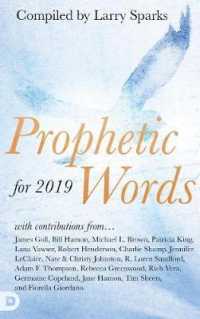- ホーム
- > 洋書
- > 英文書
- > History / World
Full Description
Dr Rosamond Faith is a leading historian of the English
peasantry in the early and central Middle Ages. In a series of influential studies,
she has uncovered the basic structures of rural society, revealing how economic
organisation, physical environment, and ideology shaped the lives of ordinary
people in the earliest documented centuries.
In this Festschrift, friends and colleagues take up
her theme, offering new perspectives on people who worked for a living between
the seventh and fourteenth centuries. King Alfred famously divided society into
three orders, but whereas the lives of 'those who fight' and 'those who pray'
are recorded in their own words, the experience of 'those who work' can only be
recovered indirectly. The essays collected here approach rural society under
three different headings, each examining a different dimension of peasant life.
The first section addresses the organisation of rural
society. Every locality was subject to
instruments and processes regulating the exploitation of the landscape, whether
administrative or co-operative in nature, and whether operating on a regional
or manorial scale. A second group of essays considers how the rural population
was classified, and how this reflected or obscured realities on the ground. Administrative
documents employed social categories which did not necessarily align with everyday
usage, while people whose livelihood was not wholly agricultural, or not
entirely encompassed by the manor, had a light documentary footprint. Further
papers address the practicalities of agricultural production. While much was
dictated by universal constraints, scientific and topographical studies shed
light on adaptations in technology and cultivation systems.
The
expert contributions assembled in this lively volume include local studies
ranging from Devon to Lincolnshire and will be of interest to anyone thinking
about the social history of medieval England.
Contents
Preface and acknowledgements
1 Introduction:
approaches to the medieval English peasantry
H.C. Boston and Richard Purkiss
Part I: Organising the landscape
2 Rendlesham
in context: Anglo-Saxon territories in East Anglia
Tom Williamson
3 Old
hides for new thegns: the Witney charter bounds and estate development, 969 and
1044
John Blair
4 Commons
and property in the south Lincolnshire fens
H.C. Boston
5 Westminster
Abbey's mandates to the bailiff of the manor of Birdbrook (Essex) in the early
fourteenth century
Phillipp R. Schofield
Part II: Peopling the landscape
6 The
significance of the geneat in Rectitudines Singularum Personarum
Tom Lambert
7 Wicing
Batswegen: an eleventh-century witness in south-west England
Lesley Abrams
8 Independent
peasants on the eve of the Conquest
Richard Purkiss
9 Classifying
the English manorial population in the Domesday Survey
C.P. Lewis
10 Finding
freedom in the thirteenth-century English countryside
Stephen Mileson
Part III: Farming the landscape
11 Ymbhwyrft:
the farming year in early England
Debby Banham
12 Experimental
archaeology and the study of early medieval farming
Helena Hamerow, Claus Kropp and Amy Bogaard
13 Little
England? Mapping Pembrokeshire settlement
David Austin
Bibliography of
Rosamond Faith's writings







